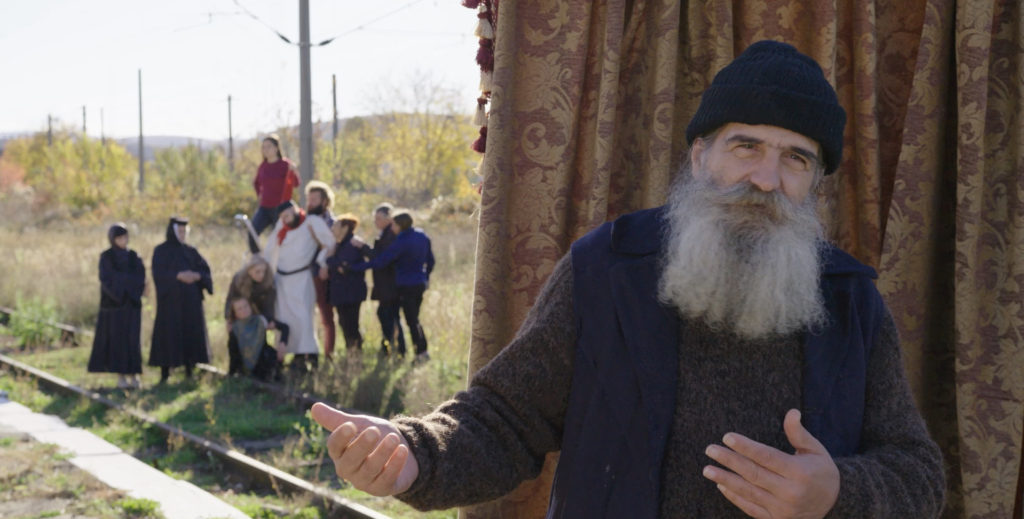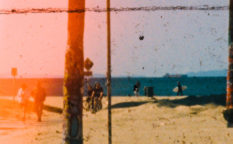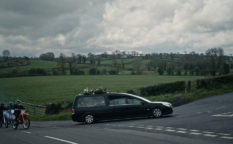Alexandru Solomon: “We are fooled into believing that the 20th century history was interrupted by some major cuts”
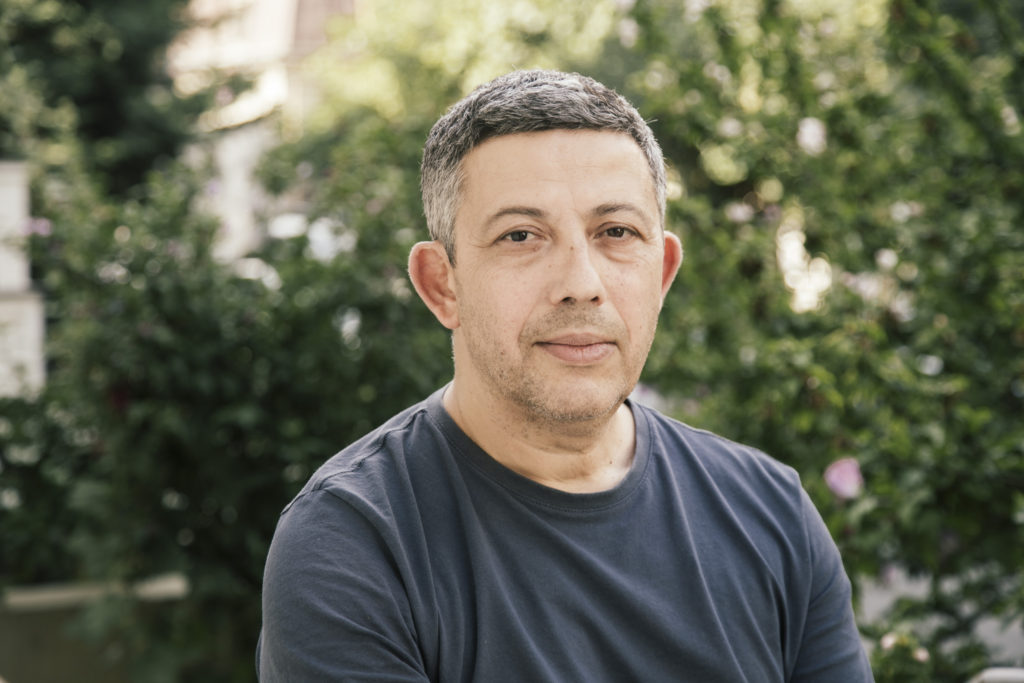
There was always a continuity between the power and the Church.
Romanian cinematographer Alexandru Solomon started making his own documentaries aside the work for other filmmakers already in early 1990s, upon graduating from the Institute of Theater and Film (IATC), the Cinematography department. His first job came a year after the graduation, when he got to stand behind the camera of Nicolae Mărgineanu’s Look Ahead With Anger (1993), but his interest in the documentary film-making came through the work as a videographer at the Plastic Artists Union. Two films about the avant-garde, one in ’92 and the other in ’95 marked the beginning of a new path, but the real step down the documentary lane was inspired by personal experiences. His works are often off-beat and deeply analytical.
With the 17th film he signs as a director, Alexandru Solomon is in the Proxima Competition of Karlovy Vary International Film Festival with Arsenie. An Amazing Afterlife about the cult surrounding a priest that rose to fame during the Causescu era for his alleged healing powers, and the current attempts to canonise him. Curious to understand the popularity of a priest who, despite of a life full of controversy, including being expelled from the church for a period of time, became a cult figure, Alexandru Solomon has organised his own pilgrimage in the company of believers, casted for the film.
We met the helmer in Karlovy Vary, where we spoke about the phenomena of Arsenie, and the lessons in history never learned.
When did the popularity of Father Arsenie explode, and what was the reason for his mythos to grow to these proportions?
Arsenie’s cult started some 15 years ago, and it was a combination of popular belief in him in the region of Transilvania where he preached and some other things. There are probably still some people around whose fathers or grandfathers knew him, but then it spread through the whole country with the help of media, which is also something I reflected about in my film. I think that his success against the others, because there are many of other ‘holy fathers’ that the Romanian church tried to promote to a higher pedestal, there are few things that make him more likeable to modern audiences. First of all, he mixed other things from other mystical sources and beliefs, which were very new-age, and supplies to the fears of modern world. He was commenting on science and technology, and the perils of their invasion. We have the AI now. So, he was ahead of his time in a sense. Also, he was very concerned about health, which we talked a lot about to his followers. I think that health is always a door through which you can appeal to the public. All these ingrediences make him something more than a regular saint.
You are not shy of tackling sensitive topics, but what’s interesting is that you casted an unusual company of people to explore the subject. How did the casting process look like?
Romania is a very religious country. 90% of the people declare themselves as Christian Orthodox, so it’s not really hard to find extras who worked in film before, and who are religious. I also tried to find people who are not necessarily dogmatic, but more mystical, and I wanted to have different generations, different educational background and minorities. For our part of the world, it is a huge topic, and also how the world will look like politically in nearest future; if you look at the resurgence of conspiracy theories and mysticism, it’s unclear what will come next.
It is fascinating that, despite of your gradual deconstruction of Father Arsenie’s mythos, the enthusiasm of pilgrims did not decrease. Or, did it?
No. This is one of the lessons that I learned during the making of this film. No one has changed their opinion, including myself, although I might be a bit more understanding and tolerant than I was before.
Belief is like a rock. You can not break it or move it through an argument, and the film was an experience that made me realize it. For the Church it is a problem that Father Arsenie was expelled and that he lived with a woman, regardless of the nature of their relationship. But the institution is one thing, and people are the other. They don’t care about about a bit of an affair he might have had. For them, he promises something that can help, and that’s it.
Before watching your film, I have never heard of the fascist Legionary Movement that was engaged in Chrystian Mysticism.
Not even Romanians know about it. They also do not really know about the monument, and this is the fault of our education system, the press, and the political environment, but althoughnof course, those nationalist movements were banned during communism, there was no mention about them in school books. Romania was considered a military dictatorship, but there was always this denial of anything else: “It’s not us. It#s the Hungarians, It’s the Germans..” It is always somebody else. So, people didn’t learn about this, and when the Communist regime fell, everything that was efore became positive and popular, including the fascist figures and nationalists. There was the resurgence of same ideologies that we had in 1930s and 1940s because people were not prepared to confront them. Even now in the history books for school, there is no mention of these movements, and if you say they were fascist, you get strange looks because nobody can concieve that we did have a fascist regime in our country.
We are fooled into believing that the 20th century history was interrupted by some major cuts, like from fascism to communism. 1989 is another big cut, etc. But if you look, there is a big continuity. The power of the Church in Romania was almost as big during the fascist as it was during the communism. Of course in the 1950s there was a great repression against the Church and many priests were sent to prison, but the higher ranks made compromises with the government. Nothing really changed, apart from some churches being demolished which is outrageousm but then there was some kind of compromise that would let the church be and deal with the rest. Even in December 1989 when the revolution started, the Patriarch of that time prayed for Caucescu and his victory. There was always a continuity between the power and the Church, and this is toxic. The Chuch hasn’t managed to admit the mistakes of the past.
How accessible are the Securitate archives?
We have an institution that took over most of the Securitate documents and made it their mission to make them accessible for the reasarchers, and the public. It was pretty easy going. It is not digitalized, but I got files printed. There were a loot of them, and it was very interesting ecause there were so many stories to discover.
I presume that this was the most time-cosuming part of the project.
Actually, that is one of the most pleasant things about making a documentary.
Can you tell us something about your idea to re-create some situations and scenes form Arsenie Boca’s life and teaching, and also about giving the secret police files to the pilgrims to read them out aloud?
In my mind, this cult of Arsenie is a fictionalized play, a sort of naive theatre play on religious topics so common in Middle Ages. I thought that the best way to embody this was to work with the pilgrims and try to re-enact the scenes, but in a very naive way.
The church was offended by what you were doing, and you were denied entrance to one church and one monastery.
Yes, but on the other hand, we were playing the sheep & wolves reenactment on the ground of one of them, so we were not 100% blocked. Will there be a dialogue with the Church about the film, that I do not know, but I will try my best to make it happen.
There are some bizarre moments, including the one in which a priest tells you that it’s not too late for you to convert to Christianism. Your patience and calmness are admirable.
In Romania people are very racially mixed, but this is not acknowledged. The country has become much more ethnically uniformed Romanian than before. Jews were killed or left, Germans left, a lot of Hungarians left, and the Roma don’t have their status as a minority recognized. There are lot of them, and the biggest issue right now in Romania is the Romanian population.
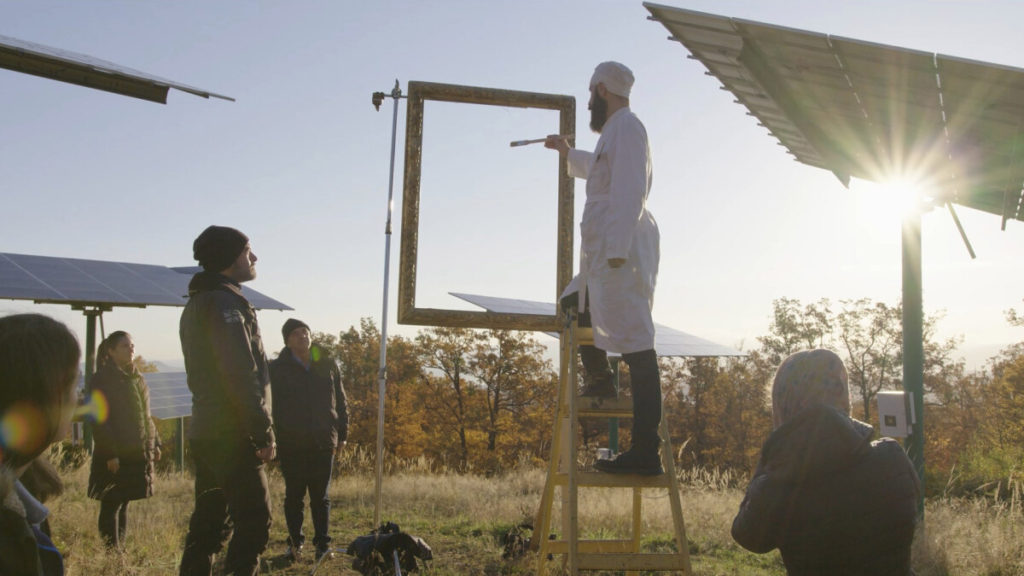
There is a bit of Christian karaoke going on in the pilgrimage bus. Whose idea was it?
Some of the extras were performing music in real life, but I was surprised when in the bus one of them mentioned how he sings in the church. When he expressed the wish to perform for the others, I said: “Why not.” We used singing to get entertained during some boring, long segments of the trip, but of course all songs were really religious. There is another performer who is playing handpan and flute, and singing in this gutural Thibetan voice which I find very interesting because he is mixing Orthodox with extremely Oriental sounds. It was enjoyable and I thinik that they brought a lot to the film.
We do not see anything that was happening behind the screen, but how was the general atmosphere in the group?
They harmonized. There were little groups of 4-5 people forming with the time according to the age or interests, but we didn’t have any missunderstandings.
You let your protagonists discuss freely diverse topics. Was anything scripted?
Nothing was scripted, but I was trying to initiate or steer a debate from time to time. I think that they enjoyed this also because extras are usually never asked to say something about themselves, or about their opinion. They are just on the set, in the background. They enjoyed being in the foreground and expressing themselves. It was a good excercise, a small democracy exercise and people do not have courage to speak up so much.
Was that anything that caught you by surprise during the shooting apart from how no one changed their opinions?
Let’s say that my biggest surprise was how much they enjoyed performing in front of ther camera. I also didn’t want to push them, so everything came from them and it benefited the film.
Do you think that your film will cause outrage after the Romanian premiere?
I have no idea. It could be outrage, or it could meet silence, be ignored, which is the worst outcome. Or it could be outrage without watching the film, which is happening a lot nowadays. People have an opinion without knowing anything. What we are trying to do with our campaign before releasing the film is to convince people to come and watch it, and then they can hate it or love it, whatever. Just watch it. The Romanian release is on August 28th, but before that we are doing some festivals. We are screening the film in Timișoara on July 16th.
